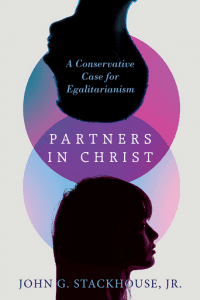 Revising language is inherent to revising our approach to the issues. So says John Stackhouse in Partners in Christ: A Conservative Case for Egalitarianism. This will entail inclusive language when appropriate in the Bible’s translations into English.
Revising language is inherent to revising our approach to the issues. So says John Stackhouse in Partners in Christ: A Conservative Case for Egalitarianism. This will entail inclusive language when appropriate in the Bible’s translations into English.
Language matters, and it matters immensely. It expresses and then shapes the world into which we speak.
John begins by observing what happened with mid 20th Century feminism and language, and the big point must not be missed: language carries codes, the codes can be come invisible, and the codes can be oppressive. This is true at the theoretical level, leaving open that not all agree with each language change. I (SMcK) think this has at times gone too far in the elite culture in the Western world, but that’s for another day and another set of conversations. Back to the Bible and inclusive language and how mid 20th Century feminists opened the door:
Likewise, mid-twentieth-century feminists successfully pressed for changes in standard English usage in at least two key respects. First, male terms, which had traditionally been used to refer both particularly to men and generally to all human beings, were restricted to the former usage only. “Man” was replaced by “humanity,” “his” by “his or hers,” and so on. Inclusive language is now required by all standard style guides as simply correct (= conventional) English. Second, the titles “Miss” and “Mrs.” were largely, if not universally, replaced by the single title “Ms.,” a pseudo-abbreviation (for it corresponded to no longer noun) that was simply meant as a female counterpart to “Mr.” No longer, that is, would a woman be characterized immediately by her marital status as if that were the most important thing to know about a woman on encountering her (136-137).
This, along with the inclusive translations like the NRSV, spawned the complementarian (or patriarchal) movement at the lead of John Piper and Wayne Grudem, not institutionalized in the Council for Biblical Manhood and Womanhood. Stackhouse tells some of this story:
Most significant and widespread among Protestants was the criticism of the Revised Standard Version (rsv) when it was issued in the 1950s. Many Christians thought that this translation manifested an ominous theological agenda: a liberal agenda, in fact, that challenged the proper interpretation of such key doctrines as the virgin birth (so Is 7:14 and the translation “a young woman” instead of “a virgin”) and the atonement (so 1 Jn 2:2 and 4:10 and the milder word “expiation” substituted for the King James Versions “propitiation”). Other Christians, however, were not convinced that the RSV was unfaithful to the Greek and Hebrew texts, and so used it as a helpful alternative to the archaic—and therefore often more misleading—English expressions of the KJV (138).
Ironical that Piper and Grudem were perceived as progressives in favoring the RSV when many conservatives of that day saw it as as the progressive Bible. So when the NRSV came out with its inclusive language, most evangelicals happily remained oblivious to a liberalizing of the already liberal Bible! Except Piper and Grudem, who saw the signs of a feminist revolution. The battle became fixed on inclusive language: should it be “brothers” or “brothers and sisters”?
The whole thing took on colossal importance (for some) when the NIV came out with the TNIV (or the UK’s earlier version, NIVI) for it had inclusive language — the translation leader was complementarian Douglas J. Moo. (Another irony got folded into the former one.) Grudem has been a fierce critic of the NIV, preferring instead his ESV (a revision of the RSV).
Stackhouse observes that all translations have some infelicities; translation is always approximate; and gender language is notoriously difficult because culture shifts constantly. Small changes, he says, are relatively minor most of the time though some make too much of them. How big are these small changes? Stackhouse:
Enough to warrant blasting a new version with a shotgun and mailing it back to the publisher? Enough to sanction financial threats to a Bible society if they don’t cease producing the offending version? Enough to justify the dismissal of a seminary professor involved in the translation project a year before his retirement? Enough to keep a new translation out of the hands of people who would welcome it both for their own reading and for sharing the gospel with friends who might be very sensitive to gender questions? (All of these have happened during the course of this controversy.)
Conservative New Testament scholar D. A. Carson describes the disproportionate reaction of some critics as “Bible rage” (140).
Including slippery slope accusations that inclusive language will lead to goddess worship. All of this is simply wrong headed ideology and fearmongering … no goddess worship yet in any translation. We might just note here that the Gospel writers translated Jesus’ Aramaic and Hebrew words into Greek, often differently and surely at times more loosely than other times, and we’re fine with Jesus himself being translated.
The issue here is social and political agendas. Stackhouse: “the explicitly antifeminist patriarchalism so important to these critics” (141).











